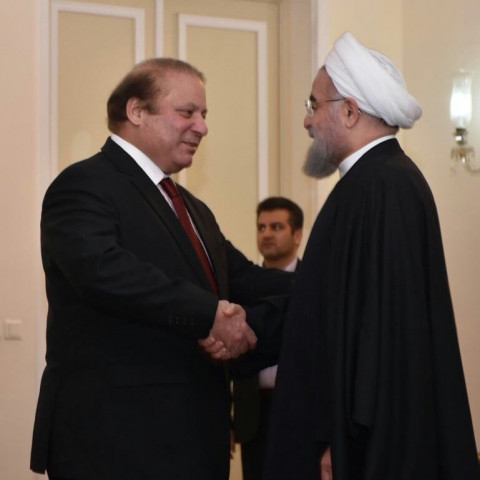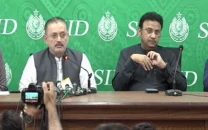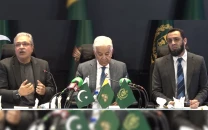Pakistan, Iran to revive ‘hotline’ between border guards
In meetings with civil, military leaders, Iranian FM discusses border security

PHOTO: PM OFFICE
The visit of Muhammad Javad Zarif, who is leading a 12-member delegation, comes against the backdrop of a recent terrorist attack in Iran’s southeastern Sistan and Baluchestan province caused an unusual friction between Pakistan and Iran.
At least 11 Iranian guards were killed and two others injured in an ambush near the town of Mirjaveh in Sistan and Baluchestan last week. The Jaish-ul-Adl terrorist group claimed responsibility for the assault in a statement. Iran claimed the assailants escaped into Pakistani territory immediately after the attack.
Reacting to the incident, President Hassan Rowhani issued a strong public statement urging Pakistan not to allow its territory to be used by such groups against Iran. Pakistan strongly condemned the attack but made it clear that the incident happened on the Iranian side of the border.
Powerful Saudi prince sees no chance for dialogue with Iran
Against this backdrop, Zarif held talks with Prime Minister Nawaz Sharif, army chief General Qamar Javed Bajwa and Interior Minister Chaudhry Nisar Ali Khan. The focus of discussions between the two sides was on how to prevent such incidents in future on both sides of the border.
According to a statement issued by the interior ministry, the two countries agreed in principle to revive the hotline between their border security forces in order to resolve any issues at the border.
To remove irritants and overcome issues of mutual concerns in the areas of border management, illegal human and drug trafficking, the two leaders decided that operational committees at various levels would be constituted.
The committees would identify areas of cooperation, addressing mutual concerns and suggesting a way forward for further enhancing bilateral cooperation between the two countries with special focus on border management, information and intelligence sharing and curbing illegal human and drug trafficking.
Further, the two neighbours reaffirmed their commitment not to let their borders and lands be used by anyone against each other.
Before leaving, Zarif visited the GHQ in Rawalpindi and met army chief General Qamar Javed Bajwa.
A statement issued by the military’s media wing suggested that the army chief had given the visiting Iranian diplomat a firm assurance that Pakistan’s soil would not be allowed to be used against the neighbouring country.
Iran's foreign minister to arrive in capital to discuss border guards’ killing
“Both sides agreed on improving bilateral boarder coordination to deny any space to terrorists,” the Inter-Services Public Relations (ISPR) said in the statement. “Tremendous bilateral cooperation potential was identified in various fields. The visiting dignitary appreciated the efforts of Pakistan and Pakistan Army against terrorism.”
The issue of Pakistan’s recent move to allow former army chief General (retd) Raheel Sharif to head the Saudi-led military alliance also came under discussion.
Allaying Iran’s apprehensions, Gen Qamar said Pakistan was committed to have lasting relations with Iran. Without mentioning Pakistan’s decision to join the counter-terrorism alliance Saudi Arabia has cobbled together, he said Islamabad would keep up its effort to reduce friction amongst brotherly Muslim countries.
His statement appears to be aimed at efforts by Pakistan to mediate between Tehran and Riyadh, which are at loggerheads due to their serious differences over the current unrest in Syria, Yemen and Iraq.
An official handout issued by the Prime Minister’s office said the premier expressed satisfaction at the increasing high-level exchanges between the two countries to strengthen bilateral cooperation in diverse fields.
Sharif hoped the two sides will continue to expand economic interaction for promoting mutually beneficial cooperation in the areas of trade, investment, energy and connectivity.
In this regard, he underlined the need of concerted efforts from both sides to achieve the target of $5 billion in the bilateral trade as soon as possible. The issues of peace and stability in the region also came under discussion during the meeting.
“On the tragic incident that took place in the Iranian province of Sistan and Baluchestan involving martyrdom of 11 Iranian border security guards on 26 April 2017, the prime minister conveyed Pakistan’s serious condolences to the government and people of Iran.”
The Iranian foreign minister thanked the prime minister and the government of Pakistan for continued efforts for strengthening bilateral relations and enhancing interaction in all areas including trade and economic cooperation as well as border and security issues.
He also conveyed the desire of the Iranian leadership and the government for continued efforts for growth in bilateral ties.
“Your visit will send a strong message to those who wanted to undermine Pak-Iran relations and always look for an opportunity to create mistrust between the two friendly countries,” Interior Minister Chaudhry Nisar was quoted as telling the Iranian foreign minister.


















COMMENTS
Comments are moderated and generally will be posted if they are on-topic and not abusive.
For more information, please see our Comments FAQ